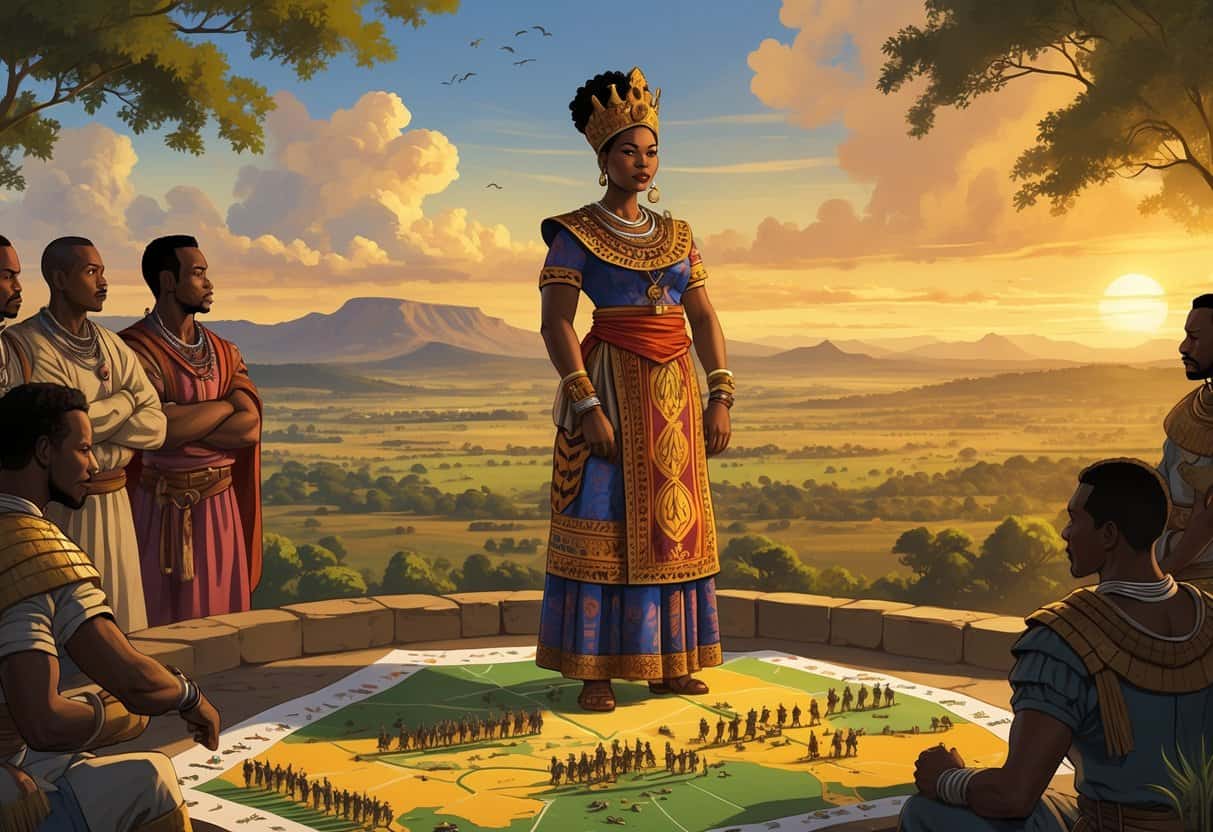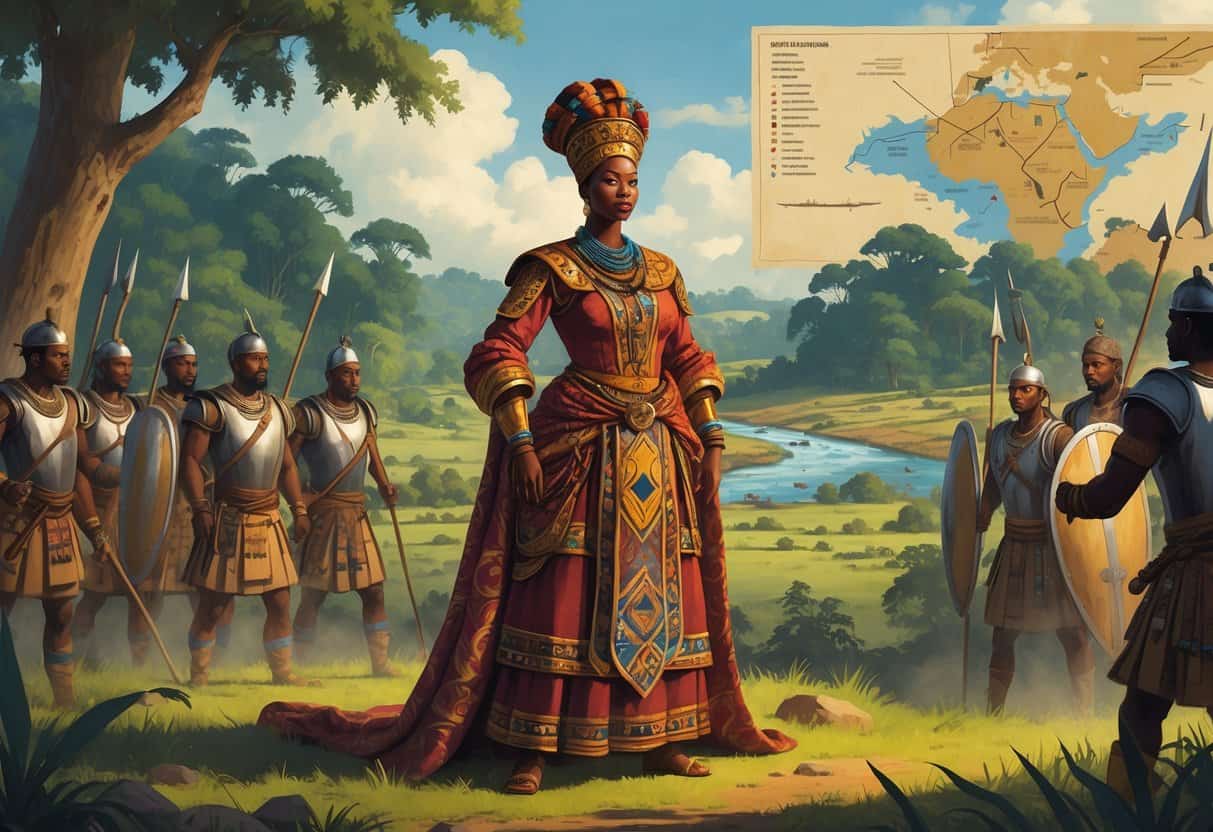Queen Nzinga was a formidable leader who blended military might with clever politics to protect her kingdom. Her strategies were both smart and flexible, letting her stand up to European colonizers and defend her people.
Nzinga’s knack for balancing war and diplomacy set her apart in African history. She wasn’t just a fighter; she was a survivor in a world stacked against her.

Nzinga mixed battlefield tactics with alliances and social reforms. Her political genius kept her alive when enemies closed in, and she managed to improve life for the people she led.
Her methods show just how powerful it can be to combine different skills. Sometimes, leadership is about knowing when to fight and when to talk.
Nzinga remains a symbol of resistance and leadership. Her story matters—a lot.
Key Takeways
- Nzinga used clever military tactics to protect her kingdom.
- She was sharp in politics and diplomacy, keeping her grip on power.
- Her leadership is still relevant for understanding history and resistance.
Historical Context and Rise to Power

Let’s get into the world Nzinga grew up in, the early challenges she faced, and how she managed to rise through it all. This isn’t just background—it’s the stuff that shaped her into the leader she became.
Precolonial Africa and the Kingdom of Ndongo
Before Europeans showed up, Africa was full of kingdoms like Ndongo. Nzinga would eventually rule there.
Ndongo sat in what’s now Angola, home to the Mbundu people. The kingdom was rich in culture and traded things like ivory—and, unfortunately, people.
European powers, especially Portugal, wanted control over trade and resources. The slave trade tore communities apart and shifted power around.
Nzinga’s Early Life and Formation as a Leader
Nzinga was born into Ndongo’s royal family in the late 1500s. She picked up politics and military skills from a young age.
Even as a girl, she showed sharpness and strength. That earned her respect in a court that didn’t usually make room for women leaders.
She mastered diplomacy and strategy, standing out as someone who could survive and thrive in a dangerous world.
Political Landscape and Colonial Threats
When Nzinga came to power, the Portuguese were pushing hard into Africa. They wanted Ndongo’s land and people for the slave trade.
This set off nonstop conflict. Nzinga had to be careful—sometimes fighting, sometimes making deals.
She built alliances, even with the Dutch, to push back against Portugal. War, shifting friendships, and high stakes were the norm.
| Key Players | Role |
|---|---|
| Portuguese colonizers | Seeking control and involvement in slave trade |
| Dutch allies | Supported Nzinga to counter Portugal |
| Mbundu people | Indigenous people of Ndongo |
| Local rulers | Some sided with colonizers, some resisted |
Nzinga’s Transformative Military Strategies
Nzinga fought back against stronger European armies with smart, flexible tactics. She didn’t just rely on brute force—she mixed new strategies, built alliances, and used technology like gunpowder weapons.
She also did something bold: she put women in leadership roles in her military.
Guerrilla Warfare and Tactical Adaptation
Nzinga leaned hard on guerrilla warfare. Instead of meeting the Portuguese head-on, her troops hit fast and disappeared.
Quick, surprise attacks kept the enemy off balance. Dense forests and rivers became her allies.
When the Portuguese brought heavy forces, she avoided open battles. Her troops moved quickly, using the land to their advantage.
These tactics stretched the Portuguese thin and let Nzinga hold out for decades, even with fewer resources.
Use of Alliances and Diplomacy
Nzinga was a master at making alliances. She teamed up with groups like the Dutch, who also wanted to weaken Portugal.
These partnerships gave her access to weapons—muskets, gunpowder, the works. Her army got stronger.
She even brought in former enemies, offering them protection or a stake in power. This built a bigger coalition against the Portuguese.
Her talent for negotiation meant she could build power off the battlefield, too.
Integration of Gunpowder and Technology
Nzinga didn’t ignore new tech. She made sure her forces had gunpowder weapons—muskets, sometimes even small cannons.
European allies helped her get these, and she trained her troops to use them alongside traditional styles.
It wasn’t common for African armies to have this firepower at the time. Nzinga’s approach nudged warfare in the region toward something more modern.
Role of Women in Military Leadership
Nzinga wasn’t content to just lead as a woman—she brought other women into command positions.
She fought alongside her troops, earning respect the hard way. That was rare, and it broke the usual gender rules.
Her leadership showed women could be just as tough and strategic as men. It’s a powerful message, even now.
She also pushed back against colonial violence and injustice. Nzinga’s reign still stands as proof that women can change history.
Political Genius and Enduring Legacy
Nzinga’s strategies weren’t just about war. She used tough politics, shrewd negotiations, and a deep respect for African traditions.
Her work shifted how power operated and helped fight the spread of slavery.
Negotiation, Diplomacy, and the Fight Against Slavery
Nzinga wasn’t just a warrior—she was a sharp negotiator. She met with Portuguese leaders and demanded respect.
Sometimes she’d sit on a slave’s mat during talks, making a point about humility and strength. She used both war and words to try and slow the slave trade.
Her mix of force and diplomacy helped protect her people’s freedom, at least for a while. Later African leaders would take notes from her playbook.
Cultural Restoration and Storytelling
Nzinga made a point of restoring pride in African culture. She encouraged storytelling and ceremonies to keep her people united.
She pushed for black education and made sure oral histories didn’t disappear under European influence.
These efforts built connections between communities. Keeping traditions alive gave her people strength to resist outside control.
Nzinga’s Place in Pan-Africanism
Nzinga’s story fits right into the Pan-African movement. She’s a symbol of unity and resistance.
Her fight against slavery and colonialism inspired later efforts for African solidarity and freedom.
Today, Nzinga’s name comes up in conversations about black education and cultural heritage. She’s a leader who helped shape Africa’s sense of pride.
Nzinga’s Impact on Modern Thought and Global Community
Nzinga’s leadership is still a model for how strategy and vision can change history. Her influence stretches across cultures and generations.
Her life connects to big ideas about resistance, rights, and identity.
Comparisons with Great Thinkers and Leaders
You can draw a line from Nzinga to leaders like Martin Luther King or Nelson Mandela. All fought for their people’s freedom and dignity.
Nzinga’s diplomacy reminds me a bit of Kwame Nkrumah, who also saw the value in building alliances. Her resistance echoes Malcolm X’s calls for self-defense.
She stands with African leaders like Shaka Zulu and Haile Selassie—defenders of their people’s land and culture. Nzinga’s courage and strategy put her in good company.
Influence on Feminist and Social Justice Movements
Nzinga is a big deal for women of color and feminists. She shattered gender expectations by leading armies and ruling a kingdom.
Activists look to her for inspiration. Her resistance to colonialism connects to ongoing fights against racism and oppression.
Her story shows how gender and race overlap in struggles for equality. Nzinga’s example gives strength to movements pushing for women’s rights and respect, everywhere.
Nzinga in African American and Global Historical Narratives
Nzinga pops up a lot in conversations about the African diaspora and African American history. People like Marcus Garvey admired leaders who stood up to colonial powers, and Nzinga’s resistance became a symbol of pride for Black communities everywhere.
In the bigger picture, Nzinga’s story is a solid reminder that African women didn’t just sit on the sidelines—they shaped their nations. Her years spent fighting the Portuguese fit right into the larger story of pushing back against European colonization.
Nzinga’s life? It’s a window into how local battles sometimes ripple out into global movements. Her courage still echoes today, influencing ideas about justice and freedom.